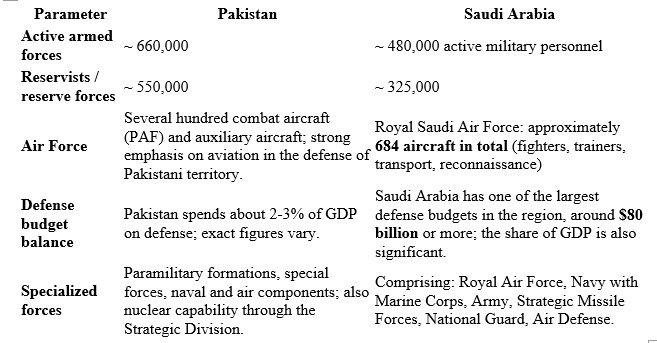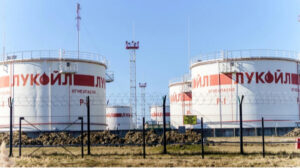
According to Serbian Economist, Saudi company Midad Energy is considered one of the main contenders for the purchase of foreign assets of Russian oil company LUKOIL, which include retail assets in Serbia, Reuters reports, citing sources.
According to the agency, this involves LUKOIL’s international asset portfolio, with an estimated value of around $22 billion, which includes oil and gas fields, oil refineries, and a network of gas stations in approximately 20 countries. The sale is linked to tough US and UK sanctions against the company, imposed in October 2025.
Reuters notes that Midad Energy CEO Abdulelah Al-Aiban is the brother of Saudi Arabia’s national security adviser Musaed Al-Aiban. According to sources, the company is preparing a cash offer with funds placed in an escrow account until the sanctions against LUKOIL are lifted.
In addition to Midad Energy, ExxonMobil, Chevron, private investment fund Carlyle Group, Emirati conglomerate International Holding Company (IHC), Hungarian MOL, trader Gunvor, Xtellus Partners bank (together with a group of investors led by Todd Boehly and the Emirati Allied Investment Partners), Abu Dhabi state-owned company ADNOC, and Austrian entrepreneur Bernd Bergmeier.
Source: https://t.me/relocationrs/1949
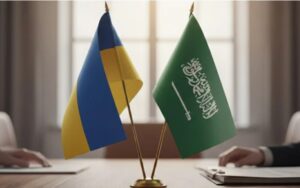
Ukraine and Saudi Arabia have resumed the Joint Business Cooperation Council after a 10-year hiatus, with Ukraine presenting a portfolio of investment projects worth more than $1 billion, according to the press service of the international food and agrotechnology company MHP.
The agricultural holding company noted that the decision to resume the activities of the Joint Council was supported by Ukrainian President Volodymyr Zelensky and Crown Prince Mohammed bin Salman during a meeting in March 2025 in Riyadh. The restoration of this mechanism is an important step towards forming a new architecture of strategic partnership between the countries.
Agroholding MHP, which headed the Ukrainian delegation at the meeting, noted that among the investment projects presented are initiatives in the fields of agro-industry, medicine, engineering, critical materials, logistics, retail, and the creation of industrial parks — areas that correspond to the goals of the Kingdom’s Vision 2030 program. Kingdom.
MHP Director of International Cooperation and Secretary General of the Business Council Mikhail Bno-Ayriyan emphasized that the return of the Ukrainian delegation to Riyadh after more than a decade symbolizes a new stage in the development of economic relations between the countries.
“Ukraine is going through a difficult period in its history, but we have not stopped – we have adapted. The economy continues to function, and the financial system remains stable. We are convinced that the potential for cooperation between our countries significantly exceeds current indicators. That is why the Joint Business Council should become a mechanism that will open up access to this potential,” said Yuriy Melnyk, Chairman of the Ukrainian part of the Council and Deputy Chief Executive Officer for Sustainable Development at MHP.
The Ukrainian delegation took part in negotiations with the leadership of the Saudi Food and Drug Authority (SFDA), discussed the resumption of Ukrainian chicken exports to the KSA market after the end of epizootic restrictions, the accreditation of Ukrainian pharmaceutical manufacturers, and the coordination of online audit procedures to confirm the compliance of production facilities.
The Ukrainian component of the business council brings together committees on agribusiness, medicine, engineering, critical materials, IT, logistics, energy, and industrial parks. The delegation included executives from companies that generate more than 4% of Ukraine’s GDP, in particular, MHP, BGV, Epicenter, Dobrobut, Interchem, Darnitsa, Kernel, SoftServe, and Orion.Group.

Ukraine maintains a significant positive trade balance with a number of key partners, which partially offsets the deficit in relations with China and EU countries.
The largest surplus in the first half of 2025 was recorded in trade with Egypt — $605.0 million. Spain ranks second with a balance of $515.3 million, followed by the Republic of Moldova — $448.4 million. Positive dynamics are also observed in relations with the Netherlands ($357.6 million), Algeria ($276.6 million), and Lebanon ($243.8 million).
Ukraine also has a high trade surplus with Iraq ($189.0 million), Libya ($133.6 million), Saudi Arabia ($128.4 million), and Kazakhstan ($113.6 million).
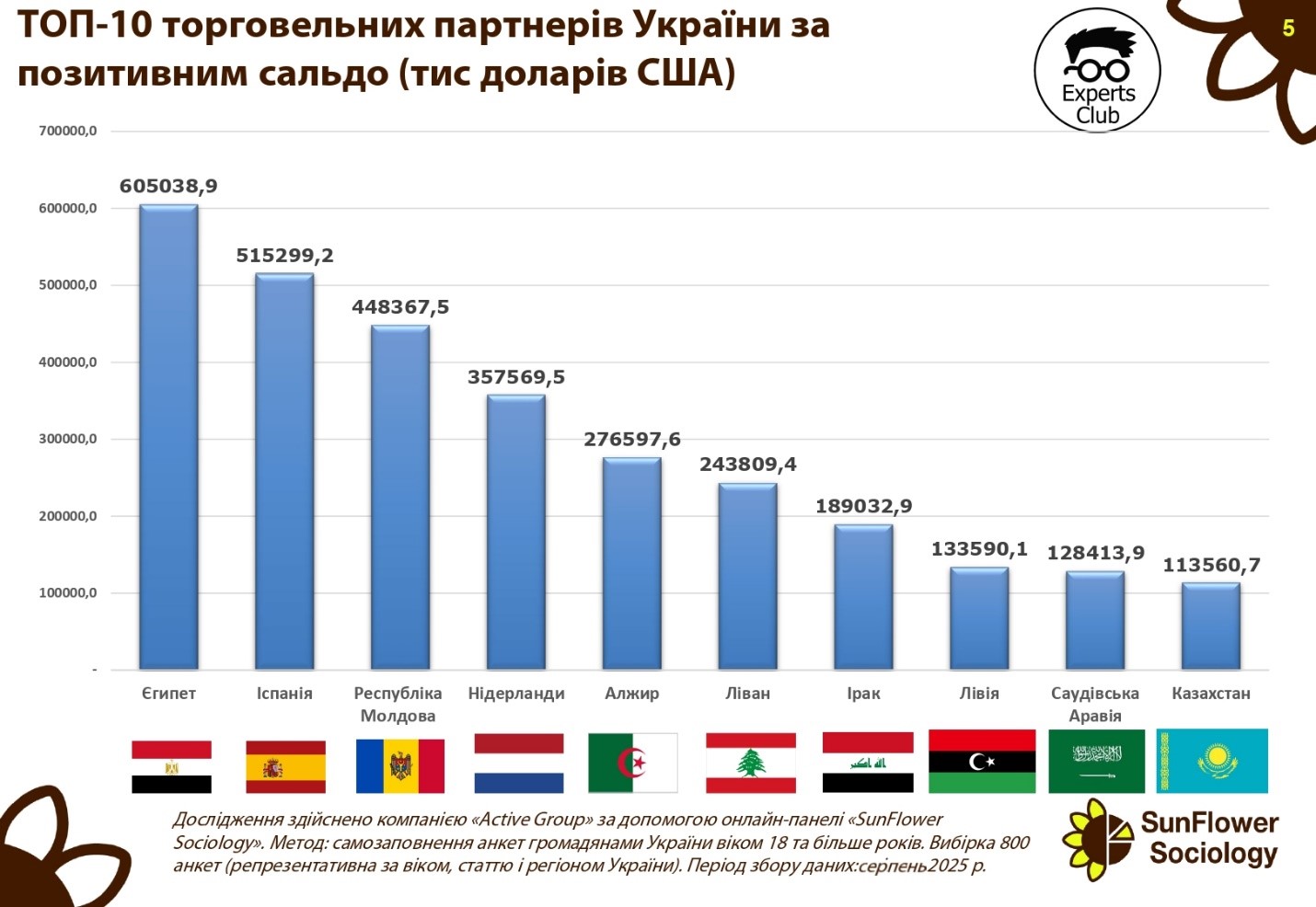
“The positive trade balance indicates that Ukraine is capable of competing effectively in international markets, especially in the agricultural sector and metallurgy. At the same time, it should be borne in mind that these markets are vulnerable to changes in the global economic situation, price fluctuations, and political factors,” emphasized Maksim Urakin, founder of Experts Club and economist.
According to him, maintaining a positive balance in relations with the countries of the Middle East and North Africa is a key element of Ukraine’s foreign trade strategy.
“Egypt, Spain, and the countries of the Arab world are stable importers of Ukrainian agricultural products. This is a strategic direction that needs to be developed further, as it creates a safety cushion for the economy against the backdrop of significant import costs,” Urakyn emphasized.
Analysts note that consolidating positions in the African and Middle Eastern markets could become a long-term factor in strengthening Ukraine’s foreign economic balance.
Agricultural exports, ALGERIA, ECONOMY, EGYPT, EXPERTS CLUB, FOREIGN TRADE, IRAQ, KAZAKHSTAN, LEBANON, LIBYA, MOLDOVA, NETHERLANDS, positive balance, SAUDI ARABIA, SPAIN, UKRAINE, МАКСИМ УРАКИН
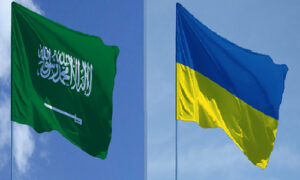
Representatives of Saudi Arabia have expressed their willingness to cooperate in the restoration of critical infrastructure in the Kyiv region, in particular in the completion of the construction of a secondary school for 600 students in the village of Hora, Boryspil district, according to the head of the Kyiv Regional Military Administration (OVA), Mykola Kalashnik.
“I held an online meeting with representatives of the Humanitarian Fund of His Royal Highness Prince Al-Walid bin Talal bin Abdulaziz Al Saud and the Ukrainian-Arab Business Council. I sincerely thanked our partners from the Kingdom of Saudi Arabia for their willingness to cooperate and their genuine interest in restoring critical infrastructure in the Kyiv region,” he wrote on Telegram on Tuesday.
According to him, the Saudi side confirmed its support for the Kyiv region and its openness to implementing joint humanitarian and social projects. “The key topic of the conversation was the discussion of the completion of the construction of a secondary school for 600 students in the village of Hora in the Boryspil district – an important facility for the community, the construction of which was halted due to the full-scale war,” Kalashnik specified. He reported that the main part of the school has already been built. However, in order to fully commission it, a number of engineering, finishing, and improvement works remain to be completed, as well as the construction of a modern shelter in accordance with safety requirements. According to the head of the OVA, the possibility of involving the Prince Al-Waleed Fund in this project was discussed with the Saudis.
“We are counting on partnership participation in financing the final phase of construction, because this school is the future for hundreds of children in the community,” Kalashnik added.
“I also invited representatives of Saudi businesses to cooperate with the Kyiv region. Our region is not only an area in need of restoration, but also a region of great opportunities. There is potential for launching investment projects in the fields of construction, agriculture, energy, and manufacturing. The interest shown by our Arab partners is further proof that the Kyiv region remains promising and economically attractive even in difficult times,” said the head of the region.
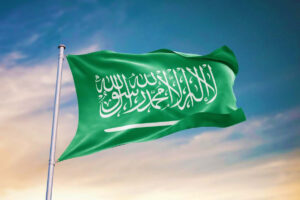
According to the results of a study conducted by Active Group and Experts Club in August 2025, Ukrainians express a predominantly neutral or moderately positive attitude toward Saudi Arabia.
According to the survey, 61.2% of respondents have a neutral attitude toward this country. A positive assessment was given by 24.8% of respondents (3.3% — completely positive, 22.5% — mostly positive). A negative attitude was expressed by 11.0% of Ukrainians (3.4% — completely negative, 9.6% — mostly negative), while 7.0% admitted that they were not familiar enough with the country.
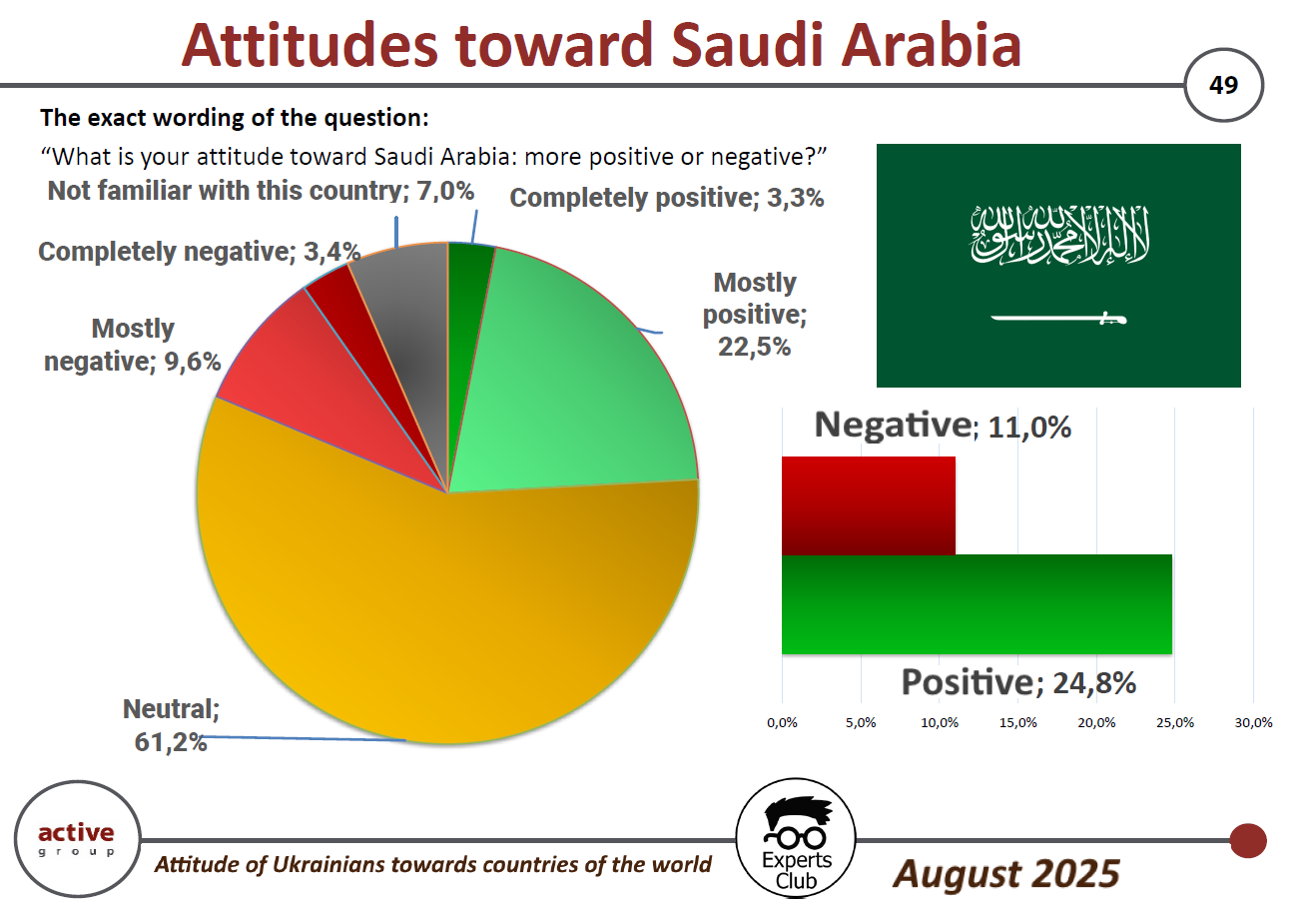
“Saudi Arabia is perceived by Ukrainians as a distant and little-known partner. At the same time, the positive assessment of more than a quarter of respondents indicates interest in cooperation and openness to the development of relations,” commented Active Group Director Oleksandr Pozniy.
Experts Club co-founder Maksym Urakyn emphasized the economic aspect:
“In 2025, trade turnover between Ukraine and Saudi Arabia reached $287.2 million. At the same time, exports from Ukraine amounted to $207.8 million, while imports amounted to only $79.4 million, resulting in a positive balance of $128.4 million. This is one of the most balanced areas for Ukraine, especially in the field of agricultural products,” he said.
The survey was part of a large-scale project by Active Group and Experts Club to study Ukrainians’ attitudes toward countries around the world.
ACTIVE GROUP, EXPERTS CLUB, international relations, Pozniy, SAUDI ARABIA, SOCIOLOGY, TRADE, UKRAINE, УРАКИН

Pakistan and Saudi Arabia have signed a strategic mutual defense agreement, under which an attack on one country will be considered an attack on both.
The agreement is called the Strategic Mutual Defense Agreement. It was signed on September 17, 2025, in Riyadh, Saudi Arabia. It was signed by Pakistani Prime Minister Shehbaz Sharif and Saudi Crown Prince Mohammed bin Salman.
The key provision of the agreement is that “any aggression against one party will be considered aggression against both.” The document does not explicitly mention the use of nuclear weapons or specific military assets, but it states that the agreement covers all defense and military means that the parties deem necessary depending on the threat.
The signing took place against a backdrop of heightened regional tensions, particularly following Israeli airstrikes on Qatar and concerns among Arab states about the reliability of US protection. The long-standing relationship between the countries includes cooperation in training, the presence of Pakistani military personnel in Saudi Arabia, and the protection of Islamic holy sites.
The military forces of Pakistan and Saudi Arabia
To understand which countries are part of the agreement, it is important to assess their military capabilities:
